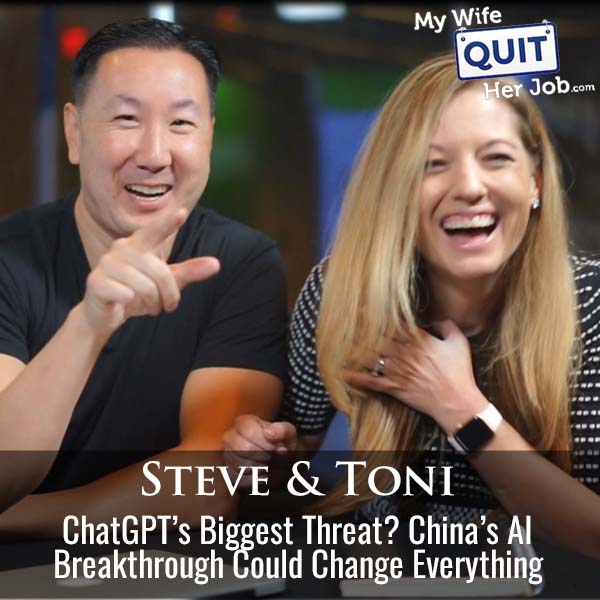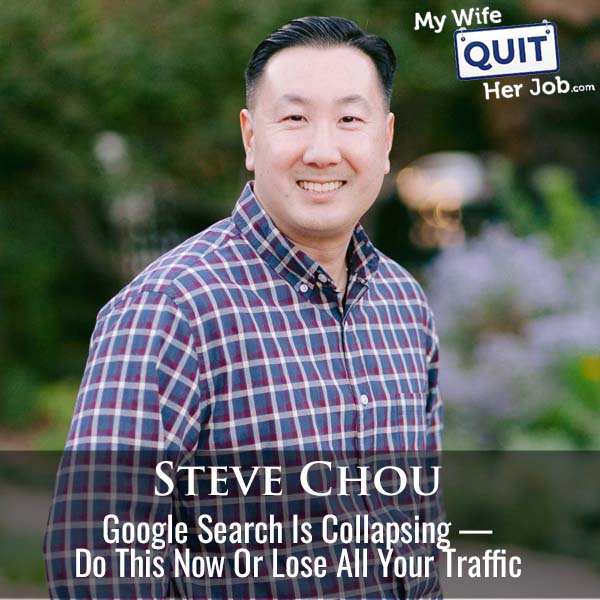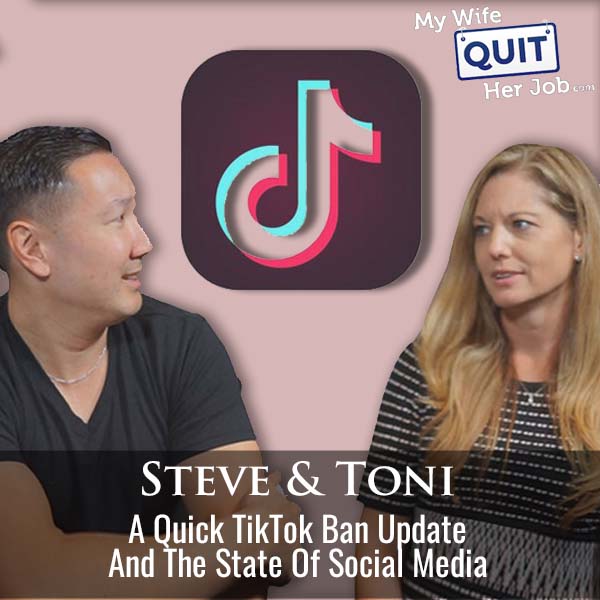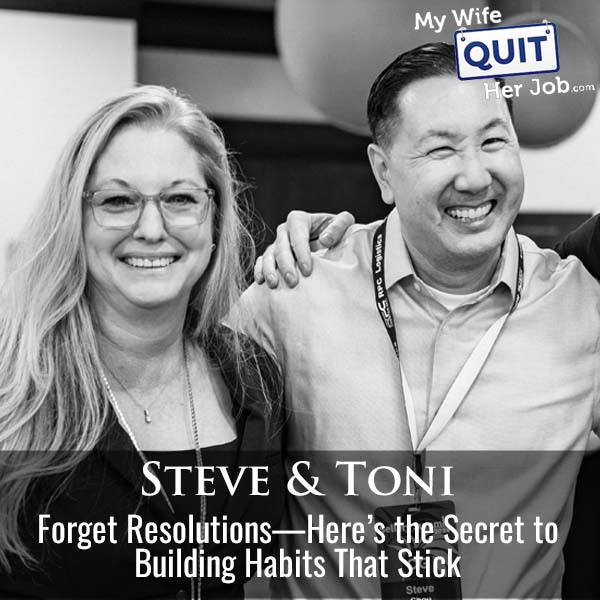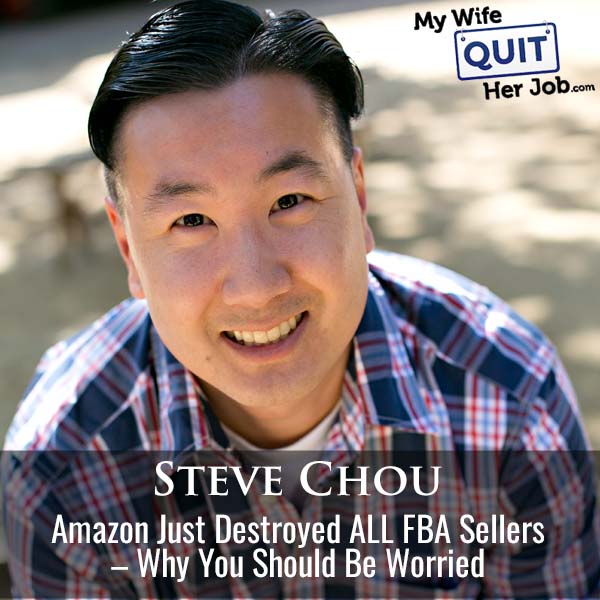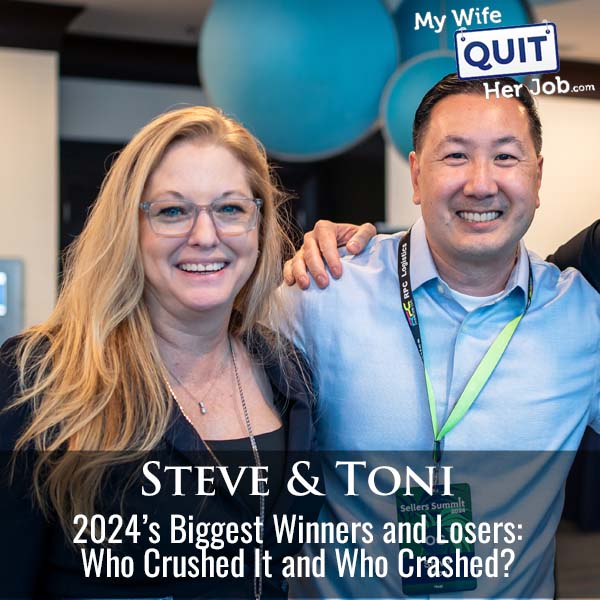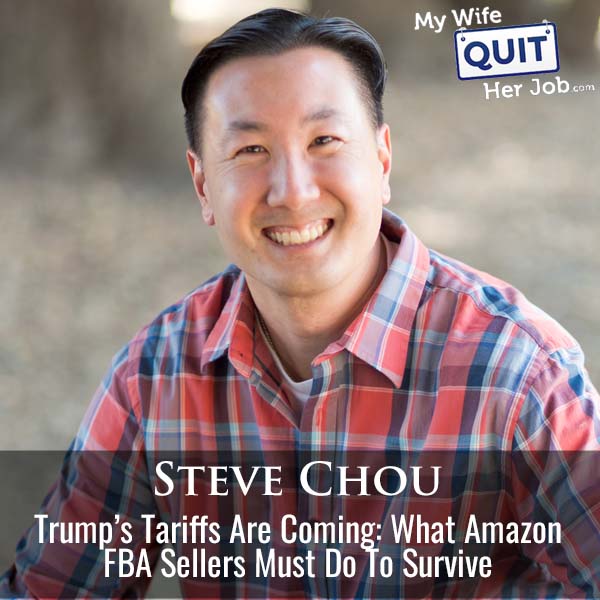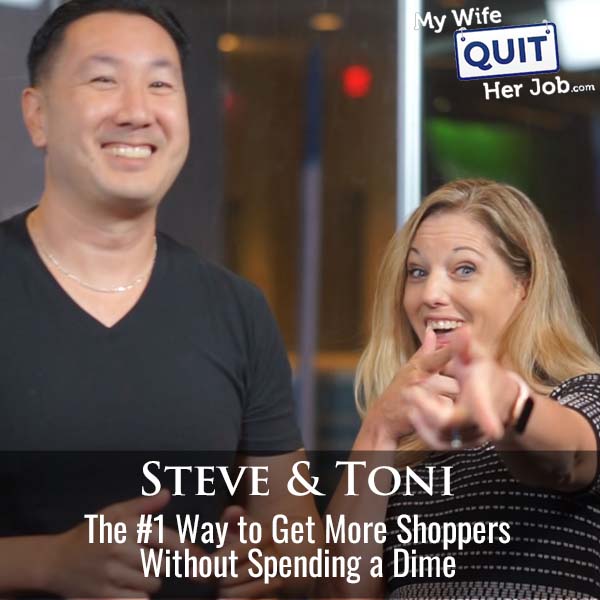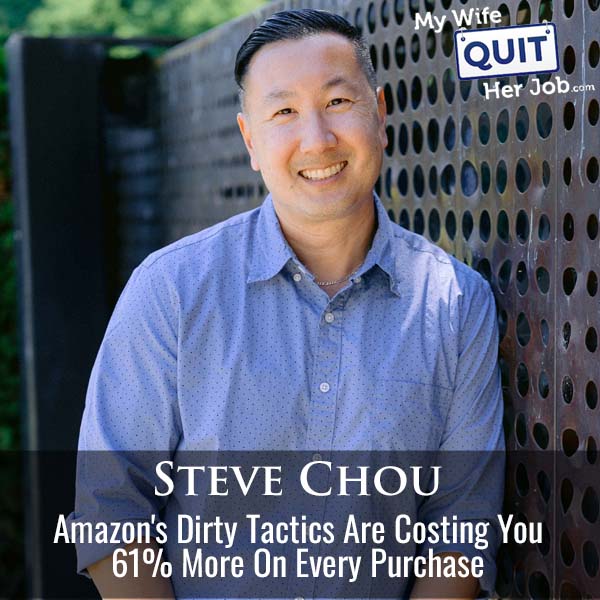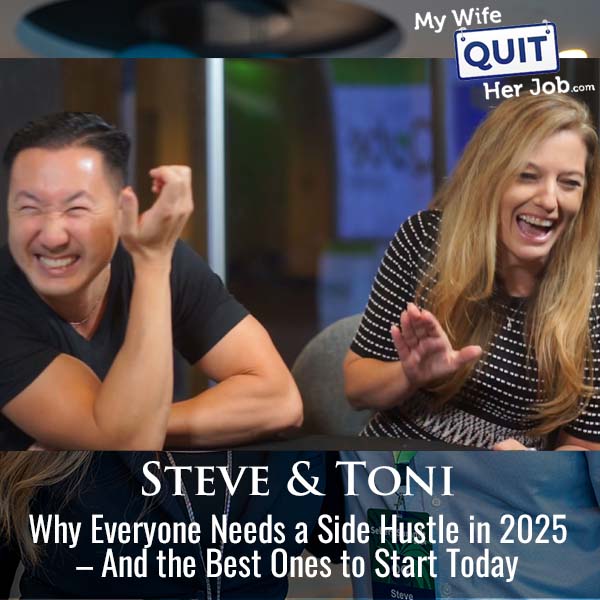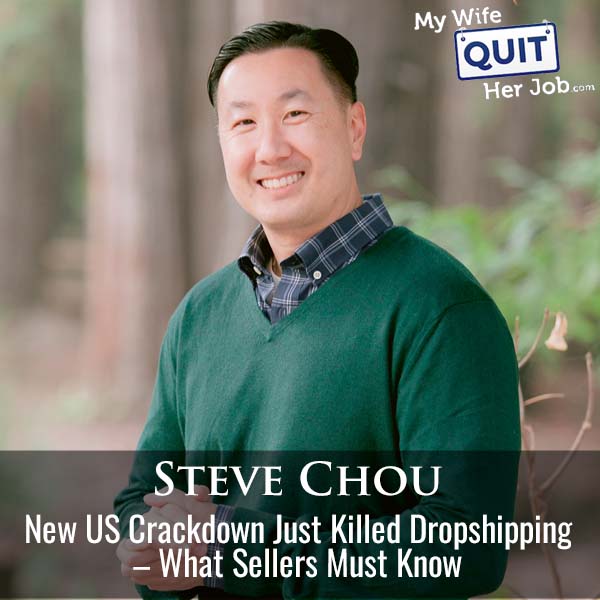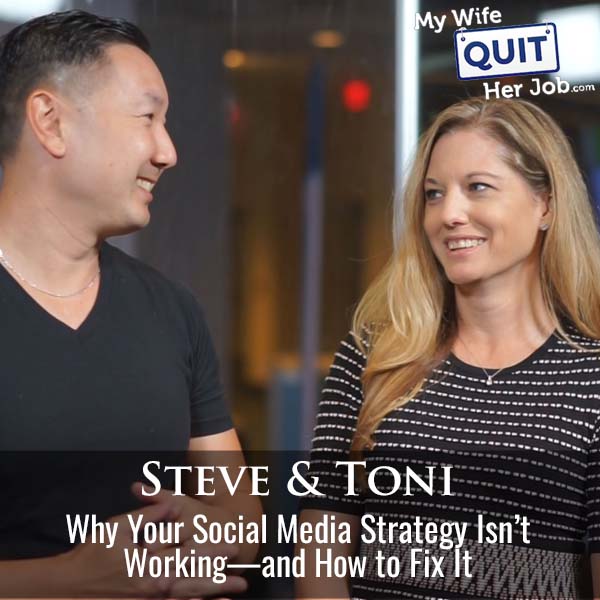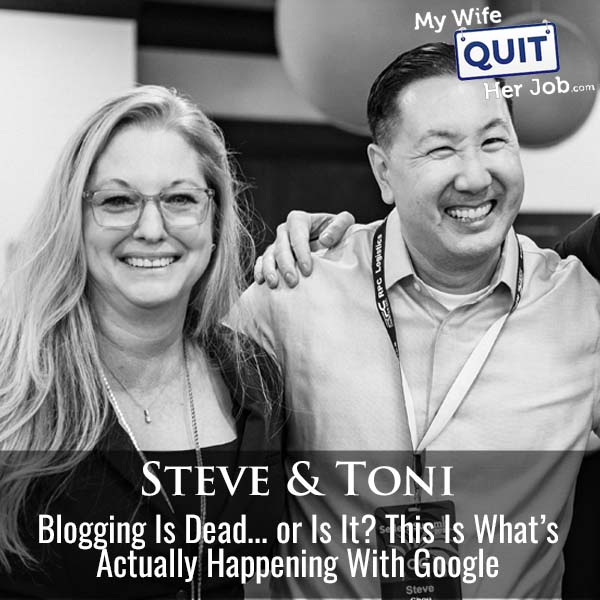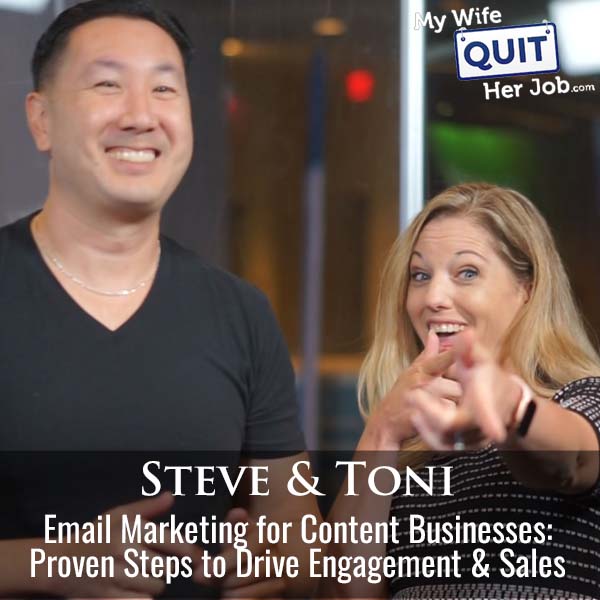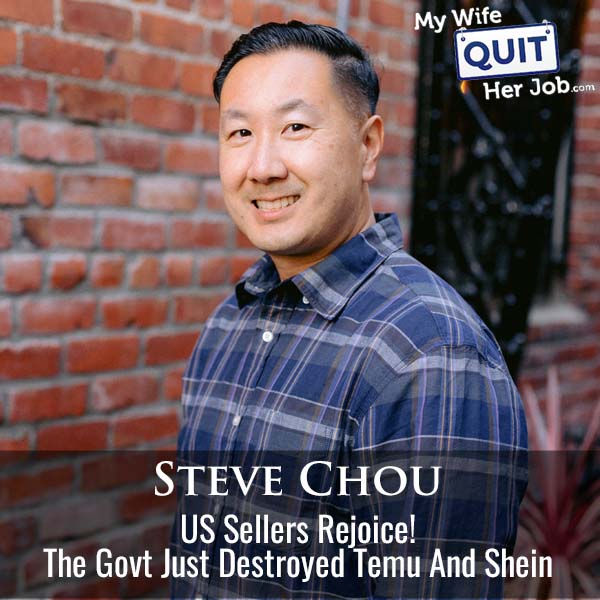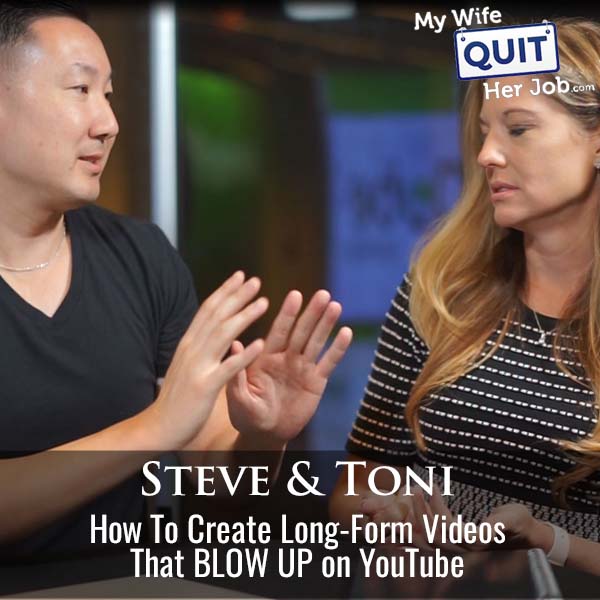Podcast: Download (Duration: 41:43 — 48.0MB)
In this episode, Toni and I discuss how China’s recent AI breakthroughs might just be the biggest threat to ChatGPT’s dominance.
We’ll dive into what these advancements mean for the future of artificial intelligence and the potential impact on the global landscape.
What You’ll Learn
- Discover the key advancements in China’s AI technology that could shake things up in the AI space
- Learn about the potential implications for ChatGPT and other AI players as competition heats up
- Get insights on how these developments could reshape the landscape of artificial intelligence globally!
Sponsors
SellersSummit.com – The Sellers Summit is the ecommerce conference that I’ve run for the past 8 years. It’s small and intimate and you’ll learn a ton! Click Here To Grab The Recordings.
The Family First Entrepreneur – Purchase my Wall Street Journal Bestselling book and receive $690 in free bonuses! Click here to redeem the bonuses
Transcript
Welcome back to the podcast, the show where I cover all of the latest strategies and current events related to e-commerce and online business. In this episode, Tony and I talk about AI models, especially the latest free one that came out of China called DeepSeek and its implications on privacy and the AI market. But before we begin, I wanted to let you know that tickets are now on sale for Seller Summit 2025 over at sellersummit.com. The Seller Summit
00:24
is the conference that I hold every year that specifically targets e-commerce entrepreneurs selling physical products online. Unlike other events that focus on inspirational stories and high-level advice, mine is a curriculum-based conference where you will leave with practical and actionable strategies specifically for an e-commerce business. Every speaker I invite is deep in the trenches of their e-commerce business, entrepreneurs who are importing large quantities of physical goods, and not some high-level guys who are overseeing their companies at 50,000 feet.
00:54
I personally hate large events, so the Seller’s Summit is always small and intimate. Every year we cut off ticket sales at around 200 people, so tickets sell out fast, and we’ve sold out every single year for the past 8 years. If you are an ecommerce entrepreneur making more than $250,000 or $1 million per year, we also offer an exclusive mastermind experience with other top sellers. The Seller’s Summit is going to be held in Fort Lauderdale, Florida from May 6th to May 8th.
01:23
Right now, this is the cheapest the tickets will ever be. So head on over to sellersummit.com and grab your ticket. Now onto the show.
01:37
Welcome back to the My Wife Quitter Job podcast. Today, Tony and I, we’re going to talk about AI because there’s just been so many things happening. I woke up the other day to my Nvidia stock crashing. oh. Like 16%. And I was like, what’s going on? And it had to do with China’s release of the new DeepSeq AI, which ironically I’d heard about the week before and I was going to try it. And then, you know, all this news came out saying, oh, they used
02:07
like 10x the resources to train that model and they’re giving it out for free open source. And apparently I think the investors took it as, well that means people need to buy less Nvidia chips. so, and then open AI obviously, who’s the leader that runs chat to PT, they crashed because this model is supposedly better than open AI’s model chat to PT and it’s free. So anyway, we’re not going to talk about the news today because that’ll bore everyone.
02:36
I don’t know. I’m like already invested. Just are you really pair? Yes. Okay. I am. Well, the other thing that happened like this morning, I don’t know if you follow Alibaba released a Okay, but didn’t they talk about this at the conference we went to last year? Wasn’t this like up and coming? No, no, no, no. Alibaba at the conference talked about using AI to help with sourcing. Okay. Yes. So this is a whole different thing. This is an AI model like Chachi PT.
03:04
Okay. That’s supposedly better than chachi PT and the one that deep deep seat, which is the latest one that came out. Yeah. And they announced it today right before Chinese new year. Okay. I have so many questions. have so many questions. Okay. Sure. My first question is, what is it called? Deep seat, deep seat, seek, seek. Deep seek. So this is a Chinese product.
03:28
It is. It’s a Chinese open source project, which means all the source code for everything is all released and you can download it and run it on your laptop if you want. Right. My first question is, since we just recorded a podcast on the uprise and fall of TikTok, is this something that will be around? Is this going to get banned? I don’t want to talk about conspiracy theories here, but there’s this conspiracy theory that now that China’s lost TikTok,
03:54
Like, it’s like you have to enter in all your information to get access to this model. What’s all your information? I think name. Actually, I didn’t fill it out. I didn’t completely fill it out. You use my name and address? But definitely email, for sure. OK, yep. But once you’re in, all the things that you type into it, if you look at the terms of service, they’re allowed to look at all that information. OK.
04:23
Unlike OpenAI where you can, I think there’s a box that you can check or something where they won’t, you know, look into all the stuff that you’re typing in personally. Yeah. Yeah. So my, I wonder like, this, will this stand the test of Trump? guess is the question, right? This is much more invasive in my opinion than TikTok because you’re typing in questions about your everyday life. You’re asking it stuff. Yes. Potentially giving, you know, the owners a lot more information.
04:51
that you get from TikTok. Because I can only imagine. Do you remember like, I don’t know if, I don’t know, because I don’t use Google a whole lot anymore. And I don’t know if chat GPT does this, but you know how in Google you type in, how do I, and then it will start finishing it for you. Yeah. And like the top one is always like, how do I poison my wife? Right. It’s like always something like really crazy. And you’re like, are that many people searching for that? Or like, how do I fake a car accident? Just your search history. That’s all. Not mine. Mine’s not like that at all. But.
05:20
You know what saying? When you start typing into Google, you can see the most common things that people type in. My thought is that people ask AI questions that they probably don’t know they want. They don’t want the rest of the world to know about. Yes. By signing up for this and using their free service, you are passing all that information to the Chinese government, essentially. Right. Then also, can it be used to convict you of a crime? You could go down a rabbit hole on this thing, but…
05:50
Yes. So that’s the conspiracy theory. I didn’t want to even bring it up, but you brought it up. I’m like so curious. And then the new Alibaba one came out. I don’t even know what it’s called. It’s got some weird name, supposedly better than DeepSeek literally just announced one week later and it’s better than open AI. It’s better than DeepSeek. And once again, it is free. And who owns that? Well,
06:17
Good question. It literally just came out this morning, so I just saw the headline and I didn’t Is it owned by Alibaba? I think so. That would also be Chinese. I think it’s open source. Let me just do a Google Haul. Alibaba AI model, is it open source? There’s just no way that this DeepSeek is going to be allowed to be used, especially if you said you can download it on your computer if we won’t let people have TikTok.
06:46
It doesn’t look like, I don’t think the Alibaba one is open source, but the DeepSeq one definitely is open source. So it looks like the Alibaba one’s owned by Alibaba, but it’s a Chinese company. in theory, the government could get access to all the queries that are typed in there. Actually, that’s another, let’s just get, I want to get this out of the way because now I’m not going to be able to sleep at night. So you know how when you get arrested, I mean, you don’t know and I don’t know either. Oh yeah, know. Yeah, of course.
07:16
This is what happens when I spend a weekend with Andrea watching her true crime shows on TV. You know how they can use your Google search history or your computer? Our friend Kevin talks about this a lot, like incognito isn’t really incognito. So they can use your browsing history to help convict you of something. Can people can law enforcement, the authorities, whatever, use your A.I. history? Like, can they log into your is that also like available for people to use to then? You know, what’s funny is these are not the questions that I think about in life.
07:46
But I would imagine the answer is yes. Well, it goes to the privacy issue, right? It’s not because you or I are planning on committing any crimes. It’s more about if all of the because the whole reason why TikTok, you know, they banned it and then brought it back is the whole data issue. Right. And where is your data going and who has your data? And so to me, with these AI tools like this is basically overtaking Google. Right. It’s going to be the new search. It’s the new search for people. And so.
08:14
Is that something that they can use then against you, for you, whatever? I think if the government subpoenaed that information, I don’t know the answer to question. It hasn’t happened yet. So I don’t know the answer to that question. But I do know this is what I think is going to happen since we’re talking about predictions here. I think that China is just going to make all these models for free because right now you have to pay for Chachi BT, you have to pay for Claude. And I think you have to pay for Gemini, actually, the higher tier. Yes, you do.
08:43
So China is just going to release all these models that are as good as what’s out there for free and harvest all this information from people. I agree. It’s like the next TikTok, but better. But then what do you do with that information? What would you do? As a Chinese person? Yeah, well, you’re Chinese, so don’t you? I don’t know what I would do, but you can mine it for information. Based on what people are acquiring, it’s kind of like Google, right?
09:13
What are people interested in? And then use that information for marketing or, and if you want to get really nefarious, you can introduce propaganda. I don’t know. Right. Here’s the big conspiracy theory. Once they have all these users, they can tailor the AI results to feed whatever information that they want. And what’s funny about this is I think someone typed in
09:42
Tenement Square into Deep Seek and I think there was nothing. Right? So clearly it’s already been tainted in some way. Yeah. So this is so interesting because they can obviously they have the power to do this, but I like how we automatically assume that like Chachi BT and Claude are not already doing that. The difference is it’s an American company.
10:09
But you think Americans are that good? I don’t. I don’t. But supposedly in OpenAI’s terms, and I never read these terms in privacy policies, but they’re not supposed to. Well. Right? I mean, do you really believe, like, genuine, I mean, I don’t want to get all like conspiracy theory. I don’t believe this because, OK, here’s a story that just kind of popped in my feed. It was an older story. But you know how when you’re just talking about something on your phone and all of a sudden you get an ad for it? Yes.
10:38
Well, it turns out there was a company that was listening. Yeah. And they told us for so long, oh, we can’t listen. It’s not possible. It’s against terms of service. They fed us that for years. And Zuckerberg still fed that to us. Yeah. in the end, it was some third party company that was doing it through whatever, right? It reminds me of when my kids were little and like I used to have to hide cookies after I made them and they would always like
11:06
wake up in the middle of night and eat the cookies and then I would confront the culprit and he was always like, it was obviously one of the boys. And he’s like, I didn’t take the cookies, mom. And he didn’t take them. He had his brother take them and then they both ate them. But it was like, I didn’t do this. I’m fully aware of the other party that’s doing it, but I’m going to maintain my end. That’s what it sounds like. The seven-year-old, I didn’t take the cookie prank. But I can’t tell you how many people have signed up for Deep Seek already in just one week. Don’t you think that’s terrifying?
11:36
I mean terrifying. Or did you sign up? No, I didn’t sign up. I was afraid to because it asked me for all this. Well, you can sign up through Google, ironically, with a Google login. can, yes. Where Google will pass your email and all that stuff. I was going to wait till someone else downloaded it and gave it to me so I could run it on my PC, actually. One of my buddies is going to do that on a burner box. OK, we need to have Kevin do it. He’s probably got all the equipment. Yeah, Kevin can probably do it.
12:06
But yeah, this all happened in the last week and I’m still processing it. I mean, free is pretty compelling, right? It’s only 20 bucks a month, though. 20 bucks a month? That’s a Netflix. Actually, does it even pay for a Netflix? I don’t know anymore. their prices. know. Everything’s so expensive these days. just. Wait, I always wanted to ask you this. Are you paying for any tool right now, AI tool? Yeah, I pay for Chachipetit. Chachipetit.
12:34
I’m about to switch it and pay for Claude and not pay for you, but I haven’t run out of the free Claude yet. don’t use it. I run out of free Claude. My kids use it in 20 minutes. They’re out. Now that I just hired a video editor and I’m going to start making more videos and scripts and stuff like that, I’m going to switch it over because I don’t use it. I use ShoutGPT, for example, the other day when-
12:59
We had to switch our AWS login information and I couldn’t figure out how to add you as a user and it wasn’t super obvious. I was like, I’ll Google it. And you’re like, chat GPT it. And I was like, but chat GPT isn’t a verb yet. So let me keep saying Google. I mean, I was planning on looking at chat GPT for the answer, but I was like, I don’t know how to say that as a verb. But that’s kind of how I use chat GPT at this point is like today I was doing something in Google Sheets and I needed to know how to create a formula. So I just went to chat GPT and of course they tell you exactly.
13:28
And with that stuff, feel like ChatGBT is always pretty correct. You don’t get in a rabbit hole of this wasn’t right. But yeah, with the script and stuff, I’ll probably be working more with Claude. So I’ll probably end up switching the paid subscription over there. But yeah, $20 a month is, it adds up when you have a couple of those. I mean, just $20 a month versus free and potentially better. don’t trust anything that’s free. That’s the problem.
13:58
Well, that’s you, but just think of like the average American. Yeah. Right there. Let’s just take the employees that work for Bumblebee. I know for a fact that they would go for the free version. They don’t care. Yeah. Right. Yeah. Over the paid version. Even me today, actually, I recently just canceled my mid journey subscription. Did tell you this? In case you guys are listening, mid journey is like an
14:23
Image AI tool where you can just generate images and I was using those for my YouTube videos thumbnails and whatnot But the free ones are they’re not as good, but they’re good enough Yeah, you know, so why why am I paying ten to twenty dollars a month for something that I? get for free as long as you don’t have hands. You’re fine Yeah, so same same goes I mean if
14:50
If this deep seek, and this is something that you could actually in theory just run on your computer, I’m pretty sure most people aren’t gonna do it that way. Yeah, I was gonna say, that was my next question for you is like, can the average person, like you say open source, that doesn’t mean anything to me. I mean, I know what it is, but like I’m never going to take advantage of that. I think most people are not gonna do that. And it does require kind of like a hefty computer, like you need a good video card. The reason why that was attracted to me,
15:20
was because right now when you do image generation, it censors it. Like if you wanted to do an image on like Trump, for example, or something like that, it would not let you do that. It doesn’t let you do images of famous people just because I guess there could be a lot of abuse for that. But when you download the model and tweak it or whatever, you can do whatever you want with it. Okay, so this is gonna be a dumb question, but I…
15:48
I promise you there’s someone listening that has this same misunderstanding that I do. If you download it onto your computer, then how are they going to get any data if it’s now your- They can’t. They cannot. Okay. I couldn’t make that connection. That’s correct. They cannot. Like you said, no one’s going to do that, right? You have to spend $1,000 on a video card, a couple thousand dollars to run the better models, the bigger ones.
16:15
And so we’re talking maybe like a $3,000 expense just to be able to do this. But if it’s open source and… So let’s say I’m… So could you potentially use this for… Let’s just use Bumblebee as an example. Could you use the open source to build your own AI for Bumblebee for customer service and all that? Like, where’s my order and those types of things.
16:43
Or does it I don’t know about that bit. And here’s why. Let’s say 200 people decide to chat with Bumblebee Linz at once. My little PC is not going be able to handle that. OK. So it’s more about resources. Yeah. For me, I would just use it as my own personal AI that I could just tweak and mainly generate images that I want to generate. Because that’s one of the reasons why I canceled Mid Journey also.
17:10
Like I just wanted some basic, like I wasn’t gonna do anything malicious, just some basic pictures of people who are well known, right? And it wouldn’t let me do that. This is not where I thought the episode was gonna go. I you had so many questions. I have a lot of, okay, we can shoot. Well, no, no, it’s okay. mean, what I wanted to talk about was like all the models and everything that are out there just for people who are listening that don’t follow all this stuff. But I mean, that was the big news for the week, obviously, deep sea.
17:37
which caused markets to crash. And I think Alibaba’s announcement today caused the markets to crash again today, because I woke up this morning and seeing a bunch of red. Interesting. So for the everyday AI user, I think every AI tool minus the new ones that have just been released, they have a paid tier. Yes. So what would you tell someone? Because I’m always amazed. I feel like because we live in this digital marketing world, everybody we know has been using AI for like two years.
18:07
Right. But then I talk to people who don’t really live in this world and they either have heard of it, they use it a little bit, but they’re not. I would say, where do people get started if they haven’t really jumped in yet? I just introduced one of my clients to it six weeks ago and she’s literally said she wanted to marry Claude when I was with her this weekend. That’s what my mom said.
18:30
Because she has to write these scientific papers and her grammar isn’t great, right? She has all the data, but it’s hard for her to put on paper. She’s like, oh my God, with ChachiPT, I can write these papers so quickly now. Yeah. Yeah. And so she said something along the same lines, not Mary, but She’s marrying Claude. My friend is marrying Claude. But imagine, most people haven’t even scratched the surface. Have you used voice with ChachiPT where you can have a conversation with it?
18:59
No, my brother has, but I have not. I mean, there’s a whole bunch of functionality that most of the public has not even tried. Yeah. Yet.
19:11
I just wanted to take a moment to tell you about a free resource that I offer on my website that you may not be aware of. If you are interested in starting your own online store, I put together a comprehensive six-day mini course on how to get started in ecommerce that you should all check out. It contains both video and text-based tutorials that go over the entire process of finding products to sell all the way to getting your first sales online. Now this course is free and can be attained at mywifequitterjob.com slash free.
19:40
just sign up right there on the front page via email and I’ll send you the course right away. Once again, that’s mywifequitterjob.com slash free. Now back to the show.
19:51
One of the things that I think is a very public use case for AI that my brother has been doing is that he has been putting in medical results. You know how you go to the doctor and maybe something’s a little bit wrong with you when they run a bunch of tests and you can see the results but you have no idea what they mean, right? He will put those results in AI and they will give him multiple
20:21
OK, this level is high, but it’s actually not high based on your age and whatever. this is like this is like five common things. And it literally spits out like kind of like what your mom’s doing, this full like basically report. that I think what’s really helpful about this is that before you go to the doctor, you can basically create a list of questions that are pretty educated, right? For what you know, what your symptoms are, your test results or whatever, as opposed to going in there and not really understanding anything.
20:51
and you’ve got 15 minutes, right? To me, that’s a really good use case. But then, of course, I’m thinking, if you put all that information in there, then they have all that information about you. Maybe they do, they don’t. is correct. mean, the question is, what are they going to do with it as an individual? I was thinking, when we were thinking about harmful things, I was thinking about more as a collective, right? If everyone signs up for this free Chinese AI, the Chinese can make, it’s funny, I’m talking about Chinese people, I’m Chinese.
21:21
They can make up whatever answers they want and like massage the answers. know what I’m saying? So that’s the tricky part. That’s where I think there’s a national security threat. Because they can just put all this negative US propaganda as an answer in there. Doesn’t it feel like we’re like living in some sort of Avengers movie and Tony Stark has like created that? Like it just feels like this can’t be real, but it is like it is. But it just yeah, like the ability to manipulate the information. Like I didn’t.
21:50
I knew this, but I think I had forgotten when the whole TikTok thing blew up. I guess they have TikTok in China. In China, it’s like the stem. You have the stem tab on your TikTok account where it’s all science, engineering, math. What I’ve heard is that in China, that’s what they’re feeding kids. I don’t know if that’s true or not. I don’t know either. The app is called Douying. I know there’s a lot of sales that happen on that, like online selling.
22:19
But that’s what I heard too. I’ve just never verified it because I never tried to download that app. Yeah. But anyway, it’s like, you know, like it makes sense, right? China is feeding us stupid dances and, you know, garbage and they’re feeding their kids math, science and engineering. Right. Yeah. It’s just like, well, that’s what I would do. Start with the kids, right? Get to the kids, dumb them down and you’re you’re setting yourself up for success.
22:46
I mean, if we’re already going down this rabbit hole, you know how there’s been export controls on the chips that power AI, Nvidia chips to China, right? Yeah. And the reason why this was such a big breakthrough was they don’t have a lot of chips supposedly to do this. like a group, they made it sound like it’s just a group of researchers use like one 10th or one 20th of the amount of compute that the U S has to generate this model. That’s better than what open AI has been working on for a long time.
23:17
I see, I’ve talked to some friends here. They all think it’s full of BS. They have this underground stockpile of Nvidia GPUs and they trained it based on OpenAI. They took OpenAI stuff and trained on top of it. I don’t even know what’s true or not, because it’s still only a week old. But that’s what some of my buddies think who are in the industry. I wouldn’t…
23:46
There’s a lot of good tools that you can use already without downloading that. Yes, but you have to pay. Yes. Having to pay is, mean, look at me, right? I don’t pay for anything. I know. It’s a strong impetus to sign up for something when it’s free, I guess the other problem is that if you, like you as an individual, you’re like, well, this is totally free. I’m going to start using it. I don’t care if they know this about me. Right?
24:15
But you’re not thinking of the collective, right? Who cares if they know something about you, honestly? I don’t care what people know about me. There’s nothing that interesting. But if all of a sudden, 5 million people, 50 million people are all inputting similar pieces of data, right? Data points start to make sense. That’s where the danger is. It’s not in your individual data. It’s in the collective data. Right. So the question, I guess, is the US going to ban this?
24:44
I don’t know, but it seems much more intrusive to me than TikTok. Yeah, for sure. Like I, yeah. But let’s, let’s move on to your choices since we’re talking about this, right? Okay. So we’ve already talked about chat. Actually, let’s just talk about what things are good for and what we use them for. Yeah. The chat GPT is like my general purpose AI tool that I use all the time. like your new Google. It’s like my, yeah, it’s like a new Google. It’s like my, it’s like a Toyota.
25:12
It keeps running, Reliable. Good old reliable. Good on the gas mileage. Then Claude is what I use for creative writing and coding. Actually, I use ChadGBT for coding too. It just depends on what I have open. I want to pause on that because we get this question a lot in the course. We have some people in the course developing things using AI tools, extensions, plugins, things like that.
25:43
I thought initially you told me you like ChatGPT for coding, but now you’ve moved to Claude or you still use both? Okay. So the reason why I like Claude better and ChatGPT actually just added this feature and I haven’t really had to got a chance to try it. Claude has this nice canvas window where you can actually see in real time that it’s run. It like runs inside of it. Okay. So if you’re doing like a web app, you’re actually running the web app on Claude first before you make it live on your server, which is nice. Yeah. ChatGPT just added that functionality.
26:13
haven’t gotten around to playing around with it. So that’s why it was better. And then all the, I don’t want to get too technical here, but all the integrated development environments, I think connect to Claude by default, because Claude has been the one for coding for a while now. Who owns Claude? Anthropic. They’re the least well-funded, I think, of the AI companies, I believe.
26:41
So I think, Claude, for me, I think I just said this earlier, ChatGPT is my Google. How do I do this? How do I find this? How do I create this formula? I’m not great at math, as we all know, so I do a lot of math equations in ChatGPT. If this is a sales and I want to find out this percentage of this and that, I use that for a lot of those sorts of things. What I like about ChatGPT, if you struggle in the math-ing,
27:07
is that it tells you how it comes up with the answer. doesn’t just give you the answer. It says, take this number and multiply it by this and then divide it by this and times it by percentage and add this, whatever. So actually, I think that’s one of ChatGPT’s nice features. I haven’t really tried to do that in Claude, but for me, Claude in the creative writing is leaps and bounds better than ChatGPT for the stuff that I’m doing, as well as I feel like Claude is really good at hooks and headlines.
27:37
over chat GPT. To me, chat GPT, the headline is just too sensational. Like when you say give me a click baity title or give me a good YouTube hook, it’s like it tries to over perform, right? And it’s like, I’m gonna give you the Actually, I found it the opposite. Really? I Claude is too sensationalistic at times. I gotta tone it down. Whereas chat GPT is the opposite. Oh, maybe it’s how I’m asking for the prompt.
28:03
It could be that because I feel like Chachi BT gives me this radical new energizing transformative. I feel like that’s what- Oh, yes. I don’t use it for opening intros. I only use it for titles. Oh, okay. Yes. I do it for both and then I compare it to Cloud is always much more sensationalistic to me for a title. Interesting. I always use conversational tone.
28:30
as part of my prompt. And I think that’s why maybe I get a toned down response from it. anyway, but I also find Claude really good for creating scripts that don’t deviate too far from the original content. And then I just recently, this past week, used Claude for two contracts. Now I’m not attorney.
28:55
And I don’t recommend doing this if it’s like a contract that you like this is not where you could do your divorce papers, right? Like this is but I do think like for so I just hired this video editor and I wanted to get like a very simple contract just kind of like an agreement of like how many hours you’re gonna work. What are you gonna get paid? What are the expectations? And I didn’t want to like type it all like I was just lazy.
29:17
And so I just typed in, you know, basically like, hey, I have a contract for a video editor. These are the hours required. This is that. I gave like the parameters and it actually spit out a really good contract basically that I would be fine like using in that scenario. Right. Or like basically a work agreement, I guess is probably a better word. Contract seems pretty contract. You say make it completely unreadable. Yes. Make sure no one knows what they’re getting or losing.
29:46
But it’s done that for me a couple of times. then also, think kind of like what your mom likes it for is taking like a bunch of information. So I’m getting ready to launch something. And we basically have all these like pieces of information in it. And I was like, OK, I want to get it all in like one document that makes sense. And so I just dumped in all the information and it like first try was pretty good. First try was good enough to where all I had to do was go in and tweak it. I didn’t even have to send it through a second time. Yeah.
30:16
Yeah, it’s good for that. Usually what I do is I just take something off the web and I say, hey, is this, know, and then I modify it from there. So same thing, pretty much. Yeah. Yeah. OK. I haven’t tried Gemini at all, have you? Oh, yeah, yeah. used Gemini. The image stuff is not bad, which is one of the reasons why I quit mid-journey, quit paying mid-journey. So you’re using the free Gemini? The free Gemini, yes.
30:44
The only thing I’m paying for right now is ChatGPT and Claude depending on whether I keep running out or not. So I actually recently quit Claude because you said, oh, I never ran out of credits. I’m like, oh, okay. Let me try it for free then. And then I ran out credits. So back on the Claude bandwagon again. If you need something free, mean, things have been free for a while. Like Facebook completely open sourced their model called Llama.
31:12
that you can use within Facebook, you can use it within WhatsApp. Have you ever tried it? No, I didn’t even know about it. So you’ll notice if you open your app, there’s in the search, you can actually ask it a question, I believe, and it’ll spit out the answer. Okay. Yeah, and that’s 100 % free. And it’s open source, which means you can download it and run on your machine. From what I heard, Alama is pretty good. It’s not quite as good as ChatGPT, obviously.
31:42
It’s, know, if you trust meta, I guess you can just stop, just stop talking.
31:52
Are there any new ones on the horizon that we should know about? Is something coming? Well, there’s also Elon’s model, which is called Grok. I don’t think anyone’s going to use that, right? The problem is they all… When someone says a model is better, it’s based on these artificial benchmarks that aren’t really realistic to what most people use it for, in my opinion.
32:19
Really, you just have to try it and see if it works for your use case and how well it does. That’s what I think is probably the most important thing for people to take away outside of everyone’s data being stolen all over the world or given away freely. I guess they’re not stealing it. They make it very clear they’re going to use it. I think it really depends on what you’re doing and for what you want to use because we have people in the course that love ChatGBT. We also have people that love Claude.
32:48
I think there’s someone in there that’s using Gemini. So it really varies on, and I also think it does depend on how you write your prompts. Because you and I are getting a lot different responses from the same tool. So I’m sure we’re just doing prompts differently. And for me, it’s getting probably a better result than what you like for sensationalists and stuff like that. And then if you’re willing to pay $200 a month right now, there’s agents.
33:17
I didn’t pay $200 a month, one of my friends who’s in this industry has it. So he was like, oh yeah, go book me a plane ticket from New York to Boston or California to Boston. And it’ll go out and you give it the primers. Like, I don’t want to spend more than this. I want it to be direct. It’ll come up with the flight for you. And then it’ll stop at the credit card processing part where you can enter your credit card. supposedly DeepSeek is going to have all this stuff
33:47
It’s doing your credit card info. Yeah, for free. Right. And so if it pans out like I think it’s going to pan out, people are just going to flock to this free tool, which will maybe force the other players to go free also. Right. Which will kind of go free, though, because nothing is free. All these subsidized by the government. Well, right. But like all these other tools aren’t subsidized by the government.
34:15
By the Chinese government? No, no. Deepseek. Deepseek. Well, I’m sure it’s subsidized by the government somehow. Right. But I mean, is Claude subsidized by a government? Claude has, I think, the smallest pile of chips that they’re training on. I don’t know enough about this because to-
34:43
People call BS on me, but I think you have to selectively decide what to focus on when you’re training a model, right? Right. You want to be good at this. Do you want to be good at that? And the rumor mill here is that DeepSeq was trained for the benchmark. So it could say that it was better than ChatGPT. And this is not an uncommon practice, right? Like, I’ve been in the PC video card space for a long time.
35:11
And a lot of times in video, AMD, they tune their drivers and they tune their chips to pass these benchmarks, right? Even to the point where there was one time there was a scandal with video cards where they actually detected the name of the program being run. And then they completely did different things knowing that it was running that program so that it could perform better. So there’s all this manipulation and stuff going on behind the scenes, I’m sure.
35:40
Let’s talk about this agents one real quick, 200 bucks a month. That’s expensive. It’s agents, not Asians. I said agents. I didn’t say Asians. It’s really just a room full of Asians booking your plane tickets. No, agents. Sorry, I did not emphasize the guh. Here’s the thing.
36:08
DeepSeek comes out with a free model of this, let’s just say hypothetically. But agents, they have to, like this stuff costs money, right? Yes, to run. Yes, like you’re paying programmers, you’re paying for server, like you’re paying for all this. It’s not like some guy in his basement doing this. Right. So I don’t like, can’t be free forever because there has to be, there always is a monetization play. can be free forever. Yeah, if the government is subsidizing it. Well, Google’s been free forever.
36:39
They’re making money through ads. yes. makes money through other ways. So what’s the monetization play? Because to me, DeepSeek, there’s no monetization play. It’s a data play. And eventually they’ll sell all your data. So is that going to be the monetization play for all these people or companies over time? Because there has to be. It’s just like, so is Facebook’s free. But is it free? Not really. We’re inundated with ads and junk we don’t want to see I that’s, I think, the first business model that they’re going to try.
37:08
with ads, right? Ads and the search results. So yeah, there will be some business model for it. I think you need to attract users first, right? Which is what all these companies did. Like Meta resisted monetizing for a long time. Once they had the users locked in, then they started doing it. Same with Google to a certain extent. Once upon a time, there was no ads. I don’t know if you remember back then.
37:40
1994, I want to say, right? Or five? That was when I first started using it. Yeah, it was a very long time ago. 30 years. Yeah. I didn’t want to say how many years it was. 30 years. You were 10 using Google. We know. Right. so like to me, if you’re going to make something free, do you have a monetization plan down the
38:02
Or you you you’re going to get one. I know a lot of people start and like, well, figure it out as we go, which is not my favorite business model. But yeah, I just wonder if they make these tools free. What are we giving up for that? Because you’re paying for it some way or another. talking about US companies or Chinese companies? US companies. I think the Chinese companies like no hate on China, but I think they’re mining data. That’s what I would do. Well, yeah, this is like the best data ever.
38:32
Yes, it would be dumb not to do Why would you do it if that wasn’t your plan, in my opinion? That seems like a international espionage thing to do. for US companies, think they also want to mine data. Why do we love Klaviyo? Why do think Klaviyo is so great? Because it gives us so much data about the people, even people that aren’t customers. We know what pages they visited and what their actions are.
39:01
to the point where we can tell when people hover over stuff with certain, you know, it’s like, that’s Google, I remember Google Analytics? I hate Google Analytics now, but you know, they had like, you could have it. They did. But like, you could put it up on your, like, you could put your webpage up there. You probably can still do this. And it would show you like hot spots on your page, right? And I think, is it?
39:24
There was a Shopify tool that did that as well. It told you where people hovered There’s a bunch. Yes, there’s a bunch of tools that did that. The data is really valuable, but to me, I would rather pay than have too much of my data taken. If you want every user in the US using it, then you got to make it free. Right. Then with that data, I’m sure there’s a way to monetize it somehow, whether it be through ads or just selling the information, perhaps.
39:53
to someone who wants to. Wouldn’t you want to know if you wanted to start something or create something, wouldn’t you want to know what… It’s kind of like, do we like SEMrush and what’s it? Ahrefs, right? Because it’s telling us the volume of things. Is there an AI tool that tells you the volume of things yet? I mean, if you think about it this way, I’m just thinking about it from Bumblebee Linden’s perspective. If there’s a user who’s typing in all these wedding related questions into AI, like where’s wedding venue? Where can I get favors? Whatever. You better…
40:22
They know, right? AI knows. so, like, I would pay to get in front of that customer. Yeah, absolutely. Yeah. So that’s probably the likely monetization path going forward. And plus, you know, they’re making all this money with selling API access to all these tools that are incorporating into their tools, right? Yeah. So I’m sure they’ll find a way to fund itself. The real question is whether the return on that is
40:51
going to be more than the cost of them, all the engineers, all the hardware that’s required to do all this because it’s very heavy on compute, all the energy costs involved.
41:02
Hope you enjoyed this episode. What AI models are you using? And would you dare use the free Chinese AI model? For more information and resources, go to mywifequitterjob.com slash episode 576. Once again, tickets to the Seller Summit 2025 are now on sale over at sellersummit.com. If you want to hang out in person in a small intimate setting, develop real relationships with like-minded entrepreneurs and learn a ton, then come to my event. Go to sellersummit.com.
41:32
And if you’re interested in starting your own e-commerce store, head on over to my wife, quitherjob.com and sign up for my free six day mini course. Just type in your email and I’ll send the course right away via email.
I Need Your Help
If you enjoyed listening to this podcast, then please support me with a review on Apple Podcasts. It's easy and takes 1 minute! Just click here to head to Apple Podcasts and leave an honest rating and review of the podcast. Every review helps!
Ready To Get Serious About Starting An Online Business?
If you are really considering starting your own online business, then you have to check out my free mini course on How To Create A Niche Online Store In 5 Easy Steps.
In this 6 day mini course, I reveal the steps that my wife and I took to earn 100 thousand dollars in the span of just a year. Best of all, it's absolutely free!


